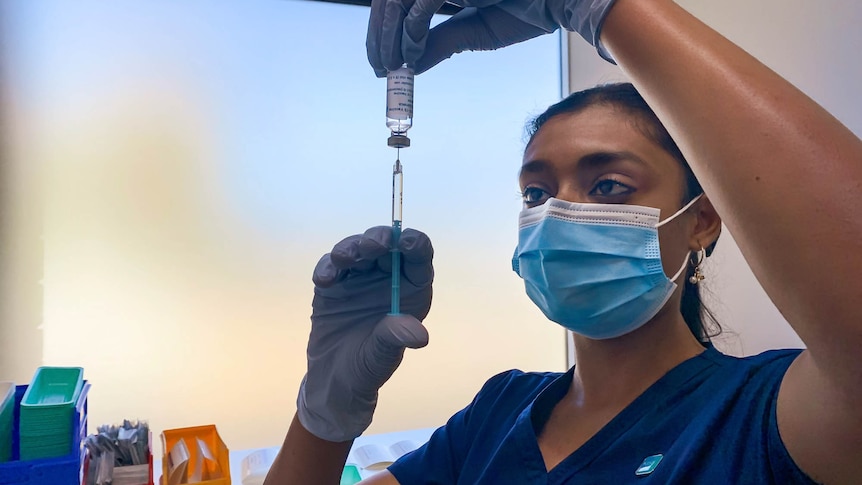Medical experts say motions passed by local councils in South Australia promoting vaccine scepticism are putting the community at risk. Since the start of this year, three local councils in South Australia's Limestone Coast region — the District Council of Grant, the District Council of Robe, and the Naracoorte-Lucindale Council — have passed motions promoting scepticism about the safety of vaccines. In addition, the Limestone Coast Local Government Association (LCLGA), made up of all the councils in the region, voted in favour of such a motion.
COVID-19 vaccines were first approved for use in Australia in February 2021. The motions passed by the LCLGA, Robe, and Naracoorte-Lucindale councils call on staff to write to state and federal health ministers to "ensure all vaccinations, both present and future, are tested to ensure they are free from contaminants and safe for human vaccination". University of Queensland infectious disease physician and clinical microbiologist Professor Paul Griffin has worked on the development of 125 vaccines and malaria human challenge studies.

He said the motions imply that past vaccines had not gone through a rigorous testing process. Professor Paul Griffin has worked on developing a range of vaccines, including eight for COVID-19. "We have one of the strictest regulatory environments in the world," Professor Griffin said.
"We make sure we have tested vaccines thoroughly, that they have to be safe and effective to be approved, and that they have to remain so to be continued to be used. "We carefully assess the ingredients as well as the safety in recipients on a continual basis to make sure that remains the case." 'Scientific rigour' A trend of local governments passing motions regarding vaccinations began in October 2024 .
The motion and subsequent motions passed by other councils are based on a debunked claim mRNA COVID-19 vaccinations were contaminated with excessive DNA. The Pfizer mRNA COVID-19 vaccine was a key part of Australia's vaccine rollout. A Canadian study claimed to confirm earlier findings by US molecular biologist Dr Philip Buckhaultz, but those findings have been debunked by fact-checking organisation .
The Therapeutic Goods Administration said it was aware of . "These reports are based on studies conducted by a small number of laboratories that have attempted to investigate the amount of DNA in COVID-19 vaccines," the TGA website stated. Councils deny being anti-vaccination The District Council of Grant was the first to move a motion directly referencing vaccines, in which it called the COVID-19 vaccine "experimentally approved" — .
When sent questions about her council's motion, Mayor Kylie Boston said the council supported "the role of SA Health in keeping our community safe". The Limestone Coast Local Government Association, made up of the seven councils in the region, also voted to write to state and federal health ministers about vaccines. "The discussion on the floor at the meeting was that none of those present had any expertise in medical matters and can make no judgement on the efficacy or otherwise of vaccines," LCLGA president and Mount Gambier Mayor Lynette Martin said.
Lynette Martin said the LCLGA raised the matter as it was of concern "to some members of the community". Naracoorte-Lucindale Council passed a motion after being presented with a petition signed by 25 residents. Mayor Patrick Ross said the council was seeking "assurances" about vaccine safety, but denied his council was questioning official health bodies and was anti-vaccination.
Naracoorte-Lucindale Council Mayor Patrick Ross denied his council was questioning official health bodies. "It has been said certainly by some of our councillors that we aren't medical experts, and have we gone and sought independent verifiable information? No, we haven't," he said. "We just wish to ensure, by asking our politicians and people responsible for the health of the nation, that if there was some erring or if there was some doubt, then that doubt should be removed.
" Severe flu season expected Medical experts are concerned this year's as flu vaccination rates fall. A on falling childhood vaccination rates. Professor Griffin said it was irresponsible for elected officials to promote vaccine misinformation in council chambers.
Professor Griffin said vaccine misinformation is leading to real consequences in the community. "To be elected, there are certain skills and expertise those people must possess to do that and we should respect their ability to fulfil that role," he said. "When it comes to health matters, we should exercise that same respect and get our advice from people with sufficient expertise to make comment.
"Australia is very lucky. We have an excellent healthcare system, a magnificent academic and university infrastructure where there are a lot of experts, and I think that's where we should try to get our information." ABC South East SA — local news in your inbox.
Top

Councils under fire for promoting vaccine scepticism
Three local councils in South Australia have been passing motions questioning vaccines, but health experts say they are based on misinformation and heighten community risk.











